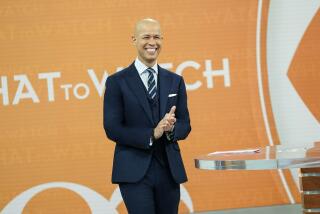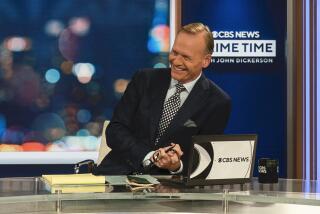It’s a Long Way From Huntley-Brinkley : Television: The Rather-Chung anchor team debuts Tuesday. CBS looks for ratings pizazz.
For about a decade now, the nightly network news has been the domain of three middle-aged anchormen--ABC’s Peter Jennings, CBS’ Dan Rather and NBC’s Tom Brokaw.
So when Rather and Connie Chung debut Tuesday as the new anchor team on CBS, it will be a significant attempt--commercially, if not journalistically--to give something of a new look to the evening broadcasts, which have been diminished in importance by CNN and a flood of other TV news alternatives.
The best and most dominant anchor team in TV history was NBC’s Chet Huntley and David Brinkley, who were a national institution from 1956 to 1970. No nightly news tandem has ever matched their depth, wit, sophistication, perspective and authority, although PBS’ longtime partners Robert MacNeil and Jim Lehrer have come close.
Brinkley’s spare, cryptic news writing and wry delivery influenced a generation of TV journalists the way Frank Sinatra influenced a generation of singers and David Letterman influenced a generation of comedians. And “This Week With David Brinkley” is still going strong on ABC.
It’s more than a safe bet that Rather and Chung, who have been paired to boost CBS’ second-place news ranking, will not be another Huntley-Brinkley. But the network clearly thinks that their combined high TV profile can compete with the pizazz of today’s news and reality series and that Chung’s popularity may help CBS overtake the nightly ratings leader, ABC’s Jennings.
Except for Huntley and Brinkley, the networks’ most successful evening newscasts have been those with single anchors, perhaps because you really don’t need two people to guide a mere 22 minutes of news reported in great part by other journalists. The exception, of course, is if there is a special chemistry between the two anchors that truly adds to the credibility and attractiveness of the program.
Despite reports that CBS pushed him into a teaming, Rather says he is pleased because he now can get out in the field more. The network, however, may also be thinking that this kind of pairing may be effective in competing with the breezy style of increasingly influential local TV news.
There has never before been an anchor team on the “CBS Evening News.” Only three men--Douglas Edwards, Walter Cronkite and Rather--have held the job, in succession. Chung thus becomes the network’s fourth nightly anchor, although it is said that former CBS journalist Diane Sawyer, now with ABC, had it in her contract that she would succeed Rather if he stepped down.
Other networks, however, have tried the multiple-anchor approach.
In 1969, ABC, looking for its own Huntley and Brinkley, paired Frank Reynolds and former CBS newsman Howard K. Smith. In 1970, ABC tried again, teaming Smith with Harry Reasoner, who reportedly had left CBS at least partly because it had become clear that he was not going to get Cronkite’s job.
Reasoner and Smith lasted for nearly five years, until 1975. Then Reasoner became sole anchor for a year--until the headline-grabbing contract that rocked TV and helped open the door for women in the medium. Barbara Walters had arrived--as Reasoner’s co-anchor at a reported $1 million a year in 1976.
It didn’t work. A strain between them seemed obvious on screen, and numerous reports suggested that Reasoner was not happy with the arrangement or her salary and the publicity that it got. In two years, Reasoner was gone, back to CBS.
And ABC tried again.
This time, in 1978, in direct contrast to the dominating Cronkite, ABC countered with a format that played down the anchor role--by revolving around four major correspondents: Reynolds in Washington, Jennings in London, the late Max Robinson in Chicago and Walters in New York, who soon left.
The program got the new title of “World News Tonight,” which remains today. And the four star correspondents were, of course, anchors of a sort. Thus Robinson became the first--and only--black anchor of a regular, weeknight evening newscast on the Big Three networks.
In 1983, Reynolds died, the format was dropped and Jennings, in New York, became the sole anchor of “World News Tonight,” climbing to the top of the ratings by the end of the 1980s and remaining in his job for the last 10 years as ABC supplanted CBS as the No. 1 network in news.
NBC, meanwhile, also attempted the dual-anchor format several more times after the Huntley-Brinkley era. During the 1970s, the new anchor, John Chancellor, teamed for several years with Brinkley, who also had a commentator role.
And then, in 1982, NBC replaced Chancellor with the new team of Tom Brokaw and Roger Mudd, unmistakably thinking it had the makings of another Huntley-Brinkley. Brokaw was the glamour guy, and Mudd was rivaled only by Brinkley as TV’s best Washington correspondent.
Mudd was yet another former CBS newsman who had vainly sought the Cronkite throne. With Cronkite leaving his anchor job in 1981, Rather and Mudd had entered a fierce competition for the post. Rather won. And Mudd soon left for NBC.
However, his 1982 pairing with Brokaw--which seemed great on paper--simply didn’t click on the air or in the ratings. In 1983, Mudd quit as anchor, and Brokaw has had the job ever since.
Along with Robinson, Chung, an Asian-American, is the only minority member ever to hold a nightly network anchor post. Along with Walters, she is the only woman. Not much to brag about in an industry half a century old.
But anchoring is often an odd business anyway. On Thursday, at the CBS affiliates meeting in New York City, President Clinton told Rather and Chung via satellite: “I think you two will be great together. I’m excited about it.” Replied Rather: “If we could be one-hundredth as great as you and Hillary Rodham Clinton have been together in the White House, we’d take it right now and walk away winners.”
Don’t know why, but I just thought of David Brinkley and smiled.
More to Read
The biggest entertainment stories
Get our big stories about Hollywood, film, television, music, arts, culture and more right in your inbox as soon as they publish.
You may occasionally receive promotional content from the Los Angeles Times.










